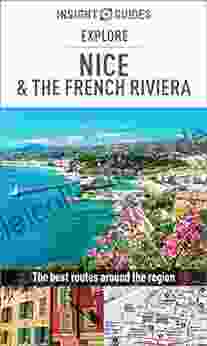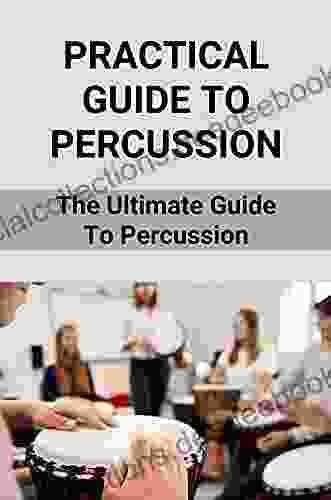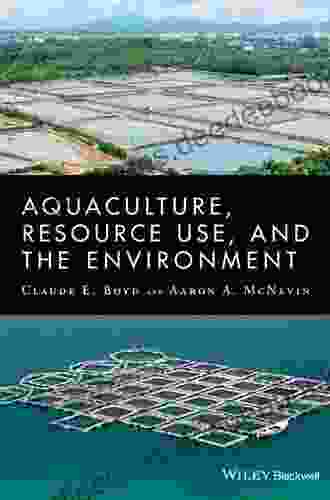Aquaculture Resource Use and the Environment: A Comprehensive Examination

Aquaculture, the farming of aquatic organisms, has become increasingly important as a means of meeting the growing global demand for seafood. However, concerns have been raised about the environmental impacts of aquaculture, particularly regarding resource use and pollution. This article examines the resource use and environmental impacts of aquaculture in detail, discussing the major issues and exploring potential solutions.
Resource Use in Aquaculture
Aquaculture requires a range of resources, including water, land, feed, and energy.
4.6 out of 5
| Language | : | English |
| File size | : | 9181 KB |
| Text-to-Speech | : | Enabled |
| Screen Reader | : | Supported |
| Enhanced typesetting | : | Enabled |
| Print length | : | 338 pages |
| Lending | : | Enabled |
Water Use
Water is essential for aquaculture, as it provides a medium for the organisms to live in and regulates their body temperature. However, the demand for water in aquaculture can be significant, particularly in areas where water is scarce. In some cases, aquaculture can also lead to pollution of water resources with wastewater, chemicals, and antibiotics.
Land Use
Aquaculture can also require significant amounts of land, particularly for pond-based systems. The conversion of natural habitats, such as wetlands, to aquaculture can have negative impacts on local ecosystems.
Feed
Feed is a major expense in aquaculture, accounting for up to 50% of the total cost of production. Most aquaculture feed is based on fishmeal and fish oil, which are derived from wild-caught fish. This can lead to a decline in fish stocks and other marine resources.
Energy
Aquaculture can also require significant amounts of energy, particularly for lighting and heating systems. The use of fossil fuels to generate energy can contribute to greenhouse gas emissions.
Environmental Impacts of Aquaculture
In addition to resource use, aquaculture can also have a range of environmental impacts, including:
Eutrophication
Eutrophication is the process by which excess nutrients, such as nitrogen and phosphorus, enter water bodies and cause algal blooms. Algal blooms can deplete oxygen levels in the water, leading to fish kills and other problems.
Pollution
Aquaculture can also release pollutants into the environment, including wastewater, chemicals, and antibiotics. These pollutants can harm aquatic organisms and disrupt local ecosystems.
Disease
Aquaculture can also contribute to the spread of diseases, both among farmed organisms and to wild populations.
Habitat Destruction
Aquaculture can also lead to the destruction of natural habitats, such as wetlands and mangrove forests. These habitats are important for a variety of marine life and provide ecosystem services, such as flood control and water filtration.
Solutions to Reduce Environmental Impacts
There are a number of potential solutions to reduce the environmental impacts of aquaculture, including:
Improved Feed Management
Improving feed management practices can reduce the amount of fishmeal and fish oil used in aquaculture feed. This can help to conserve fish stocks and other marine resources.
Alternative Feed Sources
Exploring alternative feed sources, such as insects, plant proteins, and algae, can help to reduce the reliance on fishmeal and fish oil.
Wastewater Treatment
Implementing wastewater treatment systems can help to reduce the release of nutrients and other pollutants into the environment.
Environmental Monitoring
Regular environmental monitoring can help to identify and address potential environmental impacts before they become significant.
Integrated Aquaculture
Integrated aquaculture systems combine aquaculture with other activities, such as agriculture or waste treatment, to reduce environmental impacts and improve resource use efficiency.
Aquaculture is a growing industry that plays an important role in meeting the global demand for seafood. However, concerns have been raised about the environmental impacts of aquaculture, particularly regarding resource use and pollution. By improving feed management practices, exploring alternative feed sources, implementing wastewater treatment systems, and conducting environmental monitoring, we can reduce the environmental impacts of aquaculture and ensure that it remains a sustainable source of food.
4.6 out of 5
| Language | : | English |
| File size | : | 9181 KB |
| Text-to-Speech | : | Enabled |
| Screen Reader | : | Supported |
| Enhanced typesetting | : | Enabled |
| Print length | : | 338 pages |
| Lending | : | Enabled |
Do you want to contribute by writing guest posts on this blog?
Please contact us and send us a resume of previous articles that you have written.
 Book
Book Novel
Novel Text
Text Library
Library Paperback
Paperback E-book
E-book Magazine
Magazine Sentence
Sentence Bookmark
Bookmark Shelf
Shelf Glossary
Glossary Foreword
Foreword Preface
Preface Annotation
Annotation Footnote
Footnote Manuscript
Manuscript Scroll
Scroll Tome
Tome Narrative
Narrative Autobiography
Autobiography Memoir
Memoir Reference
Reference Encyclopedia
Encyclopedia Dictionary
Dictionary Narrator
Narrator Character
Character Librarian
Librarian Catalog
Catalog Borrowing
Borrowing Archives
Archives Periodicals
Periodicals Study
Study Research
Research Lending
Lending Reserve
Reserve Journals
Journals Interlibrary
Interlibrary Study Group
Study Group Storytelling
Storytelling Book Club
Book Club Jami Borek
Jami Borek Alon Shulman
Alon Shulman Stephen Baines
Stephen Baines Sonia Mainstone Cotton
Sonia Mainstone Cotton Hannah Webster Foster
Hannah Webster Foster Aaron Freeman
Aaron Freeman Joseph Postell
Joseph Postell Lindsey Buboltz
Lindsey Buboltz Deborah L Wolter
Deborah L Wolter David Lafferty
David Lafferty Aaron Brander
Aaron Brander Natasha Kaufman
Natasha Kaufman Pat Laprade
Pat Laprade David Swanson
David Swanson Ry Reed
Ry Reed Chris Cheek
Chris Cheek Pik Shuen Fung
Pik Shuen Fung Aaron Joy
Aaron Joy Maureen Whitebrook
Maureen Whitebrook Paul Allain
Paul Allain
Light bulbAdvertise smarter! Our strategic ad space ensures maximum exposure. Reserve your spot today!

 Danny SimmonsFollow Naima As She Prepares For Her First Day Of Dance School: A Journey of...
Danny SimmonsFollow Naima As She Prepares For Her First Day Of Dance School: A Journey of...
 Herb SimmonsA History of Persecution and Perseverance in the Centennial State: Scott and...
Herb SimmonsA History of Persecution and Perseverance in the Centennial State: Scott and... Ignacio HayesFollow ·3.6k
Ignacio HayesFollow ·3.6k Timothy WardFollow ·16.2k
Timothy WardFollow ·16.2k Ernest ClineFollow ·13.3k
Ernest ClineFollow ·13.3k Grant HayesFollow ·19.1k
Grant HayesFollow ·19.1k H.G. WellsFollow ·13.3k
H.G. WellsFollow ·13.3k Chandler WardFollow ·13k
Chandler WardFollow ·13k Larry ReedFollow ·16.1k
Larry ReedFollow ·16.1k Tyler NelsonFollow ·18.6k
Tyler NelsonFollow ·18.6k

 Andy Hayes
Andy HayesEmbracing Now: Embark on a Mindfulness Journey for a...
In a world...

 Heath Powell
Heath Powell100 Hymns for Violin and Guitar: A Comprehensive Guide to...
The violin and...

 Floyd Richardson
Floyd RichardsonBark In The Park: Poems For Dog Lovers
Dogs are our best...

 Douglas Adams
Douglas AdamsThe Barter Crusade: A Journey into the Realm of Exchange...
In a world driven by monetary transactions,...

 Nathaniel Hawthorne
Nathaniel HawthorneInsight Guides Explore Nice & the French Riviera...
Prepare to embark on an unforgettable journey...

 Carlos Fuentes
Carlos FuentesThe Ultimate Practical Guide to Percussion: Exploring the...
Embark on a journey into the enchanting...
4.6 out of 5
| Language | : | English |
| File size | : | 9181 KB |
| Text-to-Speech | : | Enabled |
| Screen Reader | : | Supported |
| Enhanced typesetting | : | Enabled |
| Print length | : | 338 pages |
| Lending | : | Enabled |








